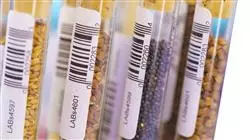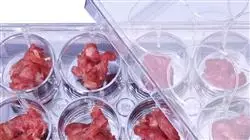University certificate
The world's largest faculty of nutrition”
Introduction to the Program
With this 100% online Postgraduate diploma you will be up to date in Enzymology and Business Management"

According to a report published by the International Labor Organization (ILO), the food industry is one of the most important and most employable economic sectors worldwide. In addition, the demand for specialized professionals in this field is expected to continue to grow in the coming years, driven by the increasing need for technology and automation in food production and processing.
These specialists perform important functions such as identifying and classifying the physical, chemical and microbiological agents that cause food spoilage and selecting the most appropriate strategies for their control. That is why TECH has created this Postgraduate diploma in order to bring you closer to the key knowledge in the Basis of thermo-bacteriology and thus gain access to important job opportunities in this area.
A 100% online program, which will allow students to delve into the fundamentals of chemical engineering, delve into the most recent advances in the field of meat, fish and their derivatives. All of this is complemented by video summaries of each topic, detailed videos, case study simulations or essential readings that you can access 24 hours a day.
Students who train at TECH will have a wonderful opportunity to be up to date on everything related to the detection of factors that damage the integrity of food. All this through a flexible university degree, whose content can be easily viewed from any device with an internet connection. In addition, students can count on the Relearning system, used by TECH, which will allow them to reduce the long hours of study and advance through the syllabus in a much more agile way.
Learn about the latest and most important information on food product quality monitoring with this degree"
This Postgraduate diploma in New Technologies Applied to the Food Industry contains the most complete and up-to-date scientific program on the market. The most important features include:
- The development of case studies presented by experts in Food Technology
- The graphic, schematic, and practical contents with which they are created, provide scientific and practical information on the disciplines that are essential for professional practice
- Practical exercises where the self-assessment process can be carried out to improve learning
- Its special emphasis on innovative methodologies
- Theoretical lessons, questions to the expert, debate forums on controversial topics, and individual reflection work
- Content that is accessible from any fixed or portable device with an Internet connection
You have an extensive resource library with which you can consult the latest information on food shelf life estimation calculations at any time"
The program’s teaching staff includes professionals from sector who contribute their work experience to this program, as well as renowned specialists from leading societies and prestigious universities.
Its multimedia content, developed with the latest educational technology, will provide the professional with situated and contextual learning, i.e., a simulated environment that will provide an immersive education programmed to learn in real situations.
The design of this program focuses on Problem-Based Learning, by means of which the professional must try to solve the different professional practice situations that are presented throughout the academic course. This will be done with the help of an innovative system of interactive videos made by renowned experts.
Thanks to this Postgraduate diploma you will be able to learn about the latest advances in the development of new processes and products in the field of meat, fish and their derivatives"

Access the latest information on environment, quality and enzyme use whenever you want, from your computer or tablet"
Why study at TECH?
TECH is the world’s largest online university. With an impressive catalog of more than 14,000 university programs available in 11 languages, it is positioned as a leader in employability, with a 99% job placement rate. In addition, it relies on an enormous faculty of more than 6,000 professors of the highest international renown.

Study at the world's largest online university and guarantee your professional success. The future starts at TECH”
The world’s best online university according to FORBES
The prestigious Forbes magazine, specialized in business and finance, has highlighted TECH as “the world's best online university” This is what they have recently stated in an article in their digital edition in which they echo the success story of this institution, “thanks to the academic offer it provides, the selection of its teaching staff, and an innovative learning method aimed at educating the professionals of the future”
A revolutionary study method, a cutting-edge faculty and a practical focus: the key to TECH's success.
The most complete study plans on the university scene
TECH offers the most complete study plans on the university scene, with syllabuses that cover fundamental concepts and, at the same time, the main scientific advances in their specific scientific areas. In addition, these programs are continuously being updated to guarantee students the academic vanguard and the most in-demand professional skills. In this way, the university's qualifications provide its graduates with a significant advantage to propel their careers to success.
TECH offers the most comprehensive and intensive study plans on the current university scene.
A world-class teaching staff
TECH's teaching staff is made up of more than 6,000 professors with the highest international recognition. Professors, researchers and top executives of multinational companies, including Isaiah Covington, performance coach of the Boston Celtics; Magda Romanska, principal investigator at Harvard MetaLAB; Ignacio Wistumba, chairman of the department of translational molecular pathology at MD Anderson Cancer Center; and D.W. Pine, creative director of TIME magazine, among others.
Internationally renowned experts, specialized in different branches of Health, Technology, Communication and Business, form part of the TECH faculty.
A unique learning method
TECH is the first university to use Relearning in all its programs. It is the best online learning methodology, accredited with international teaching quality certifications, provided by prestigious educational agencies. In addition, this disruptive educational model is complemented with the “Case Method”, thereby setting up a unique online teaching strategy. Innovative teaching resources are also implemented, including detailed videos, infographics and interactive summaries.
TECH combines Relearning and the Case Method in all its university programs to guarantee excellent theoretical and practical learning, studying whenever and wherever you want.
The world's largest online university
TECH is the world’s largest online university. We are the largest educational institution, with the best and widest online educational catalog, one hundred percent online and covering the vast majority of areas of knowledge. We offer a large selection of our own degrees and accredited online undergraduate and postgraduate degrees. In total, more than 14,000 university degrees, in eleven different languages, make us the largest educational largest in the world.
TECH has the world's most extensive catalog of academic and official programs, available in more than 11 languages.
Google Premier Partner
The American technology giant has awarded TECH the Google Google Premier Partner badge. This award, which is only available to 3% of the world's companies, highlights the efficient, flexible and tailored experience that this university provides to students. The recognition as a Google Premier Partner not only accredits the maximum rigor, performance and investment in TECH's digital infrastructures, but also places this university as one of the world's leading technology companies.
Google has positioned TECH in the top 3% of the world's most important technology companies by awarding it its Google Premier Partner badge.
The official online university of the NBA
TECH is the official online university of the NBA. Thanks to our agreement with the biggest league in basketball, we offer our students exclusive university programs, as well as a wide variety of educational resources focused on the business of the league and other areas of the sports industry. Each program is made up of a uniquely designed syllabus and features exceptional guest hosts: professionals with a distinguished sports background who will offer their expertise on the most relevant topics.
TECH has been selected by the NBA, the world's top basketball league, as its official online university.
The top-rated university by its students
Students have positioned TECH as the world's top-rated university on the main review websites, with a highest rating of 4.9 out of 5, obtained from more than 1,000 reviews. These results consolidate TECH as the benchmark university institution at an international level, reflecting the excellence and positive impact of its educational model.” reflecting the excellence and positive impact of its educational model.”
TECH is the world’s top-rated university by its students.
Leaders in employability
TECH has managed to become the leading university in employability. 99% of its students obtain jobs in the academic field they have studied, within one year of completing any of the university's programs. A similar number achieve immediate career enhancement. All this thanks to a study methodology that bases its effectiveness on the acquisition of practical skills, which are absolutely necessary for professional development.
99% of TECH graduates find a job within a year of completing their studies.
Postgraduate Diploma in New Technologies Applied to the Food Industry
The food industry has undergone a constant evolution in recent years, which has generated an increased demand for professionals highly trained in new technologies. The Postgraduate Diploma in New Technologies Applied to the Food Industry is a program designed to train students in the latest technological trends applied to the food industry.This program addresses from the automation of production processes to the implementation of traceability and quality control systems in the food chain. In addition, the student will acquire knowledge about food safety and innovation management in the industry, which will allow them to be at the forefront of the sector and face the new challenges that arise.
Postgraduate Diploma in New Technologies Applied to the Food Industry
The application of advanced technologies in the food industry is increasingly important to ensure the quality and safety of the food we consume. The Postgraduate Diploma in New Technologies Applied to the Food Industry focuses on training professionals in the application of the latest technological trends in food production, storage and distribution.The Postgraduate Diploma in New Technologies Applied to the Food Industry focuses on training professionals in the application of the latest technological trends in food production, storage and distribution.The program offers a complete training in the use of digital tools, data analysis techniques and information systems that allow the optimization of production processes and guarantee the traceability and quality of products. In addition, students will gain knowledge on innovation management, food safety and sustainability in the food industry, which will prepare them to face the current and future challenges of the sector. With the Postgraduate Diploma in New Technologies Applied to the Food Industry, students will be ready to develop a successful career in the food industry.







